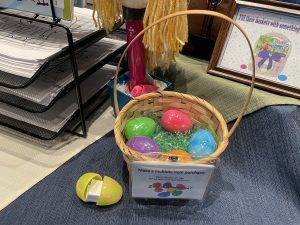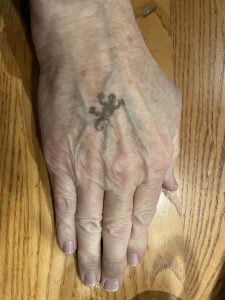Enter In
In Step
 It is a treat to spend time in warmer places during the winter months when harsher weather and colder temperatures are a staple farther north. We are not snowbirds as many people are from late fall until sometime in the spring, but trips planned here and there to sunnier climes provide a break from biting temps and frozen precipitation. A great benefit of such a trip is to be able to enjoy outdoor activities, and in my case, that means being able to take walks in the fresh air for exercise versus pounding a treadmill indoors with a stationary view.
It is a treat to spend time in warmer places during the winter months when harsher weather and colder temperatures are a staple farther north. We are not snowbirds as many people are from late fall until sometime in the spring, but trips planned here and there to sunnier climes provide a break from biting temps and frozen precipitation. A great benefit of such a trip is to be able to enjoy outdoor activities, and in my case, that means being able to take walks in the fresh air for exercise versus pounding a treadmill indoors with a stationary view.
Staying with family in Southern California, I was ready to go on one of those said walks, and looking at the sad face of the furry grandchild occupying space in that home, I thought it would be altruistic of me to take him along. After all, as a fairly large dog in a very modest home complete with a postage stamp yard, I assumed he would be more than enthused to join me. I got him ready with harness and leash, and we headed out the door and down the complex walkway to the main sidewalk adjacent to the street. My dear doggie companion was apparently not in the same headspace as I, and as I began to walk, it felt as if I were dragging a one-hundred-pound bag of cement behind me! Cash was on his feet, but his feet stayed as planted as they could be, only lifting and moving as my increasingly sore arm muscles could make them budge. This was fairly much the case for about a half hour of walking, which basically only took place along their street. In all fairness, Cash did pick up the pace as we neared their house again. So much for the health benefits of walking. At least my arms got quite the workout!
This experience caused me to wonder how many times I must look like Cash in relation to staying in step with God. I may start out trotting on the beginning walkway only to drag or come to a stop on God’s main sidewalk. This can happen in various areas in which we, as God’s children, should be involved. Our resistance can diminish true worship, hamper fellowship with others, deter speaking out for Jesus, or hinder our service to others in the church or the community. I know God is all-powerful and has a “mighty hand and an outstretched arm” according to numerous Scripture references in the Bible, but it is easy to jokingly think that some of his muscle comes from the strain I put on his extremities.
As much as our hesitation or cooperation can definitely affect others, it also impacts us personally. There are two Bible stories that come to mind, one in the Old Testament and one in the New. Though in 2 Peter 2:7, he is referred to as “righteous Lot,” he may have wound up being remembered as lingering Lot for his hesitancy to leave the wicked city of Sodom when God was poised to destroy it. “As morning dawned, the angels urged Lot, saying, ‘Up! Take your wife and your two daughters who are here, lest you be swept away in the punishment of the city.’ But he lingered. So the men seized him and his wife and his two daughters by the hand, the LORD being merciful to him, and they brought him out and set him outside the city” (Genesis 19:15-16, ESV). There is much more to the story that does not bode well for Lot and his family, but his life was spared because of God’s love and compassion that caused the angels to drag him out of the city. Otherwise, his account would have ended in Sodom.
Speaking of Peter, there is a passage in the Book of Acts that recounts his experience in prison in Jerusalem. Peter, having been put in prison for his faith by King Herod, had the blessing of the church praying for him. cell. He struck Peter on the side and woke him, saying, ‘Get up quickly.’ And the chains fell off his hands” (Acts 12:7, ESV). The angel gave further instructions, and Peter followed him to his rescue. At times he didn’t even know if the scene was real or a dream, but suffice it to say, he was able to continue his earthly journey with God because he stayed in step with the plan God had for him.
While our stories may or may not include visible heavenly beings prodding us to follow the Lord, we are still urged to stay in step with him. But we do have the Holy Spirit to help us in this endeavor: “If we live by the Spirit, let us also keep in step with the Spirit” (Galatians 5:25, ESV). He can keep us on track in our journey with the Lord. Let’s stop dragging and pulling back as he is leading. Let’s stay in step with him.
Subscribe to our free bi-monthly eNewsletter
Never Miss a Beat
 I know that in the past I’ve shared that physical coordination is not my strong suit. I recall that I took tap lessons for about half a year when I was about six. I think all I came away with was a maneuver called “shuffle-ball-change,” a move that could easily look like the beginnings of a stumble. So, I was thrilled when my granddaughters in Virginia were signed up for ballet lessons with a Christian company that uses their church for rehearsals and performances. Due to the studio’s benevolence, all four girls are able to participate. I feel especially blessed when I get to see them perform, but even when I cannot be there, it is a great use of present-day technology to view the performance live on a screen or by video a short time later.
I know that in the past I’ve shared that physical coordination is not my strong suit. I recall that I took tap lessons for about half a year when I was about six. I think all I came away with was a maneuver called “shuffle-ball-change,” a move that could easily look like the beginnings of a stumble. So, I was thrilled when my granddaughters in Virginia were signed up for ballet lessons with a Christian company that uses their church for rehearsals and performances. Due to the studio’s benevolence, all four girls are able to participate. I feel especially blessed when I get to see them perform, but even when I cannot be there, it is a great use of present-day technology to view the performance live on a screen or by video a short time later.
During last year’s recital, my then eight-year-old granddaughter, Bekah, was doing a lovely dance to “Today Is the Savior’s Day (by Rend Collective).” All was going beautifully when the group began taking side-steps toward stage left. Bekah was the farthest dancer on that side, and all of a sudden, she swung her arms and flopped right on the floor. Her recovery was immediate. To Bekah’s credit and proficient demeanor, she picked herself up, got right back in the dance, and never missed another beat! The routine was finished to perfection, and it is now a sweet and special memory to treasure.
I’m writing this message in the midst of Holy Week; we’ve just celebrated Palm Sunday. This year as I listened to the sermon at our church, I started to let my mind wander a bit to contemplate the distinct contrast between the hailing crowd that sang the Lord’s praises on his triumphal entry into Jerusalem with the rabid and angry crowd calling for his crucifixion a few days later. The most interesting thing is, it was predominantly the same people participating in these diverse events. How could those who were seemingly following Jesus get so out of step with him? To contemplate that rapid change can be quite unnerving! Of course, we know from the gospels that while they were not a part of the bitter throng save for Judas, each of the twelve disciples struggled with his own blunder in regard to Jesus. Judas betrayed him, but Peter denied him, Thomas doubted him, and most deserted him. How could recovery occur? Fortunately, the Bible records instances of reconciliation with the Lord, the most notable being Peter.
As the disciples gathered together after Jesus had already made two post-resurrection appearances to them, Peter and six other disciples of Jesus made plans to go fishing. Having an unsuccessful night on the sea of Galilee, a voice called out to them from the shore at daybreak to cast their net on the right side of the boat. When their catch of fish was so large it could not be hauled in, John immediately recognized the mystery influencer as Jesus. Impetuous Peter jumped right into the water and swam to shore. Jesus made provisions for breakfast as they all returned, and then he took time to bring Peter back into a right relationship with him. “When they had finished breakfast, Jesus said to Simon Peter, ‘Simon, son of John, do you love me more than these?’ He said to him, ‘Yes, Lord; you know that I love you.’ He said to him, ‘Feed my lambs’” (John 21:15, ESV). Three times Jesus asked him the question, matching the number of times Peter denied knowing Jesus. Though verse 17 states that Peter was grieved to have Jesus ask that third time, Jesus’ purpose was to restore Peter as his beloved disciple, servant, and friend. Essentially, Jesus invited Peter to pick himself up, dust himself off, and get back in the dance. Peter’s recovery was sure, as in the book of Acts Chapter 2, Peter preaches a heartfelt and significant sermon that confronted the Jewish leaders and compelled the people of Israel to turn to Jesus and be saved.
And so too, we are continually called to get back in step with the Lord because of his great compassion and love for us. Whether we make a misstep, a mistake, or even commit an outright sin, our recovery and ability to resume movement in the right direction is assured by this: “If we confess our sins, he is faithful and just to forgive us our sins and to cleanse us from all unrighteousness (1 John 1:9, ESV). Or if we are simply feeling a little bit off balance and need some help to recover, the Lord is always there to guide our return onto the right path. We are brought back by grace into the perfect choreography he has ordained for our lives. It is always his desire that we continue on to fulfill the purpose that he has for us. “He who began a good work in you will bring it to completion at the day of Jesus Christ” (Philippians 1:6b, ESV).
I am so looking forward to being in the audience for the girls’ next recital that takes place in just a couple weeks in which Bekah is once again a part. I am also excited to share that Bekah can be heard on our newest CD #5, Sing God’s Word – Spirit Among Us, voicing the role of Bekah Belle. I am happy to report that she did a fantastic job, and she never missed a beat!
Subscribe to our free bi-monthly eNewsletter
It’s What’s Inside
 “All that glitters is not gold.” – William Shakespeare
“All that glitters is not gold.” – William Shakespeare
Spring into summer is the busiest travel time for our business/ministry as we participate in various homeschool conferences. As a promotion for multiple purchases, we have a little incentive for our customers. Essentially, people who buy two or more products pick one of several like items that will indicate what prize they will take home along with their purchased products. The items from which they choose are associated with the concurrent season or holiday. For instance, around patriotic days we put flags in a container with numbers on them that are affiliated with our different gifts. There are artificial flowers for springtime. If we are doing an event for Christmas, we have some red and green lollipops for the game. We even have a set of plastic baby bottles for the times when we are featuring a brand-new product.
And then, there are the incredible, non-edible plastic eggs that we put on display in a pretty basket as we are nearing Easter. Each egg holds a slip of paper that reveals what the customer will receive. We use iridescent eggs that are different pastel colors. It became apparent a few years ago that not only are these an attractive decoration on our table for the Easter season, they are fascinating enough to little eyes to be a prize themselves. Recognizing their appeal, I purchased extras so that I can give a few out to those who ask, letting the recipient know that the shell is all they are getting. At this most recent conference we placed the egg basket at the front of the table. When we left for the evening, everything but the cashbox stayed in place. Upon returning the next morning, to our slight dismay, almost all of the eggs were gone! Fortunately, because of the extras I had, along with a few additional prize slips, we were able to replenish the basket and continue the game. Later in the day while we were busy with some customers, low and behold, another egg disappeared. We had to keep an especially vigilant eye on the basket from then on and hide it overnight to be able to continue our little game for multiple purchases.
 As pretty as these eggs are, I wonder how many of our pilferers were aware that the prize inside was a mere piece of paper with the promise of a gift on it. Certainly, kids are accustomed to finding treats and treasures inside a plastic egg. Could it be there was some disappointment when these little ovals were opened? The truth is that we all can be lured by shiny, pretty wrappings around what might be very insignificant contents. We go for the gleaming, the glamorous, the beautiful, the striking only to find out that there is nothing worthwhile in the acquisition, and we are disappointed not only by what is inside but by our original fascination with it and the assumption regarding the treasure it might hold.
As pretty as these eggs are, I wonder how many of our pilferers were aware that the prize inside was a mere piece of paper with the promise of a gift on it. Certainly, kids are accustomed to finding treats and treasures inside a plastic egg. Could it be there was some disappointment when these little ovals were opened? The truth is that we all can be lured by shiny, pretty wrappings around what might be very insignificant contents. We go for the gleaming, the glamorous, the beautiful, the striking only to find out that there is nothing worthwhile in the acquisition, and we are disappointed not only by what is inside but by our original fascination with it and the assumption regarding the treasure it might hold.
But then, we have a God who seems to always turn our idea of the world upside-down. He sent us Jesus, his only Son. Jesus, the unassuming, humble, even perhaps unattractive Son of Man. Jesus, the one about whom was written hundreds of years before his earthly arrival, “He had no form or majesty that we should look at him, and no beauty that we should desire him. He was despised and rejected by men; a man of sorrows, and acquainted with grief; and as one from whom men hide their faces he was despised, and we esteemed him not. Surely he has borne our griefs and carried our sorrows; yet we esteemed him stricken, smitten by God, and afflicted. But he was pierced for our transgressions; he was crushed for our iniquities; upon him was the chastisement that brought us peace, and with his wounds we are healed” (Isaiah 53:2b-5, ESV). Jesus, the one who told us that the last will be first and the first will be last, that one who desired to be great should become a servant, the one who said, “‘If anyone would come after me, let him deny himself and take up his cross and follow me. For whoever would save his life will lose it, but whoever loses his life for my sake will find it'” (Matthew 16:24-25, ESV).
No shiny covering, no glad appearance, nothing glamorous or striking to behold. But, oh the beauty within! What a wonderful truth to ponder – this Jesus the one and only came to suffer and die in our place, and those who have come to believe in him have the gift of eternal life that holds no comparison here on earth. The first glance at the outward appearance may not draw us in, but a peek inside of just who Jesus is will never disappoint and will be the most worthwhile prize we will ever acquire.
Subscribe to our free bi-monthly eNewsletter
Simple Faith
Dad’s Lifetime Home
 0 items
0 items
 Occasionally, we have the pleasure of attending a program, concert, play, musical or sporting event in which one or more of our precious grandkids are participating. Our granddaughter, Josie, is quite a musical gal and not only sings beautifully but also plays both the piano and the French horn. Recently, we were blessed to be able to go to an area-wide high school orchestra concert where students from various schools who proved themselves competent on their instruments and stood out in their own local ensembles came together to experience performing at an even more proficient level.
Occasionally, we have the pleasure of attending a program, concert, play, musical or sporting event in which one or more of our precious grandkids are participating. Our granddaughter, Josie, is quite a musical gal and not only sings beautifully but also plays both the piano and the French horn. Recently, we were blessed to be able to go to an area-wide high school orchestra concert where students from various schools who proved themselves competent on their instruments and stood out in their own local ensembles came together to experience performing at an even more proficient level. My dad was a practical man and a very hard worker. He proudly kept the same job for thirty-two years as a Blanker Operator Utility Man at a Ford Motor Company Assembly plant. He and my mother owned a modest two-bedroom, one-bath home in a neighborhood of like houses. He painted the house inside and out when needed, built extra rooms in the attic and basement, did all the lawn chores, and took care of just about everything that required repairs. He didn’t travel much, go out-to-eat, or participate in any type of recreational activities, save for the occasional horseshoe game at family gatherings. Many people might be bored with what they would call a monotonous way of life, but I would say my father was content. No complaints, no unmet desires, just a steady, dependable way to live. Simple, to say the least.
My dad was a practical man and a very hard worker. He proudly kept the same job for thirty-two years as a Blanker Operator Utility Man at a Ford Motor Company Assembly plant. He and my mother owned a modest two-bedroom, one-bath home in a neighborhood of like houses. He painted the house inside and out when needed, built extra rooms in the attic and basement, did all the lawn chores, and took care of just about everything that required repairs. He didn’t travel much, go out-to-eat, or participate in any type of recreational activities, save for the occasional horseshoe game at family gatherings. Many people might be bored with what they would call a monotonous way of life, but I would say my father was content. No complaints, no unmet desires, just a steady, dependable way to live. Simple, to say the least. For those who are reading this who may have loved ones who have never trusted the Lord to forgive and save them, my desire is that Dad’s story brings hope. One can never guess when a loved one’s relationship with the Lord will happen, nor can one assume that it likely never will. If God could save one of the greatest persecutors of the church, the apostle Paul in his oppressive prime, and if God could save my Dad at eighty-seven plus years old, he can save your loved one too. Simply commit them to his care, and trust God to bring it about in his time and in his way. Praise the Lord, he does make it so simple!
For those who are reading this who may have loved ones who have never trusted the Lord to forgive and save them, my desire is that Dad’s story brings hope. One can never guess when a loved one’s relationship with the Lord will happen, nor can one assume that it likely never will. If God could save one of the greatest persecutors of the church, the apostle Paul in his oppressive prime, and if God could save my Dad at eighty-seven plus years old, he can save your loved one too. Simply commit them to his care, and trust God to bring it about in his time and in his way. Praise the Lord, he does make it so simple! Several weeks ago I was reading Matthew’s account of the passion and resurrection of Jesus. As I contemplated his great sacrifice and the eventual victory he experienced, my thoughts brought me to Jesus’ forty-day temptation in the wilderness. The report in the book of Mark indicates that it is likely the devil sought to tempt Jesus to sin in various ways and many times more than what is written in Matthew and Luke. The three instances recorded in those books reveal temptations regarding provision, position, and power. In each case, Jesus used Scripture to combat the wiles of Satan. It occurred to me that when Jesus resisted the enemy, he exhibited two important virtues – self-control and patience. He was willing to wait on his Father’s timing in the short-term to satisfy his hunger, and for a much longer period to inherit his kingdom and to wield the authority that accompanied his rightful role. He took no shortcuts, he did not claim entitlements, nor did he push his way through to a place of ease and adulation (though legions of ministering angels were always at his disposal – from Matthew 26:53). Jesus manifested patience throughout his life and ministry, taking a much longer and harder road to the cross. His selfless act made it possible for his Father’s perfect plans to be fulfilled.
Several weeks ago I was reading Matthew’s account of the passion and resurrection of Jesus. As I contemplated his great sacrifice and the eventual victory he experienced, my thoughts brought me to Jesus’ forty-day temptation in the wilderness. The report in the book of Mark indicates that it is likely the devil sought to tempt Jesus to sin in various ways and many times more than what is written in Matthew and Luke. The three instances recorded in those books reveal temptations regarding provision, position, and power. In each case, Jesus used Scripture to combat the wiles of Satan. It occurred to me that when Jesus resisted the enemy, he exhibited two important virtues – self-control and patience. He was willing to wait on his Father’s timing in the short-term to satisfy his hunger, and for a much longer period to inherit his kingdom and to wield the authority that accompanied his rightful role. He took no shortcuts, he did not claim entitlements, nor did he push his way through to a place of ease and adulation (though legions of ministering angels were always at his disposal – from Matthew 26:53). Jesus manifested patience throughout his life and ministry, taking a much longer and harder road to the cross. His selfless act made it possible for his Father’s perfect plans to be fulfilled. A couple months ago in the midst of running errands I remembered I needed a coffee shop gift card. The shop was nearby and the route easy. When there, I made the purchase, and as I was heading toward the door, a young man and woman stepped inside. In an instant I recognized them: he had been in my son’s church youth group years before, was good friends with my youngest daughter, and my husband and I had actually attended this young couple’s wedding a year and a few months earlier. We exchanged warm hugs and greetings and chatted for a few minutes. I hadn’t realized they had moved out of state, and though it was obvious at a glance, I did not know before this encounter that they were expecting their first child.
A couple months ago in the midst of running errands I remembered I needed a coffee shop gift card. The shop was nearby and the route easy. When there, I made the purchase, and as I was heading toward the door, a young man and woman stepped inside. In an instant I recognized them: he had been in my son’s church youth group years before, was good friends with my youngest daughter, and my husband and I had actually attended this young couple’s wedding a year and a few months earlier. We exchanged warm hugs and greetings and chatted for a few minutes. I hadn’t realized they had moved out of state, and though it was obvious at a glance, I did not know before this encounter that they were expecting their first child. My sister-in-law and her husband own a cozy home near Lake Ontario in upstate New York. It is an older house, but they have renovated and upgraded throughout their time of habitation. David and Brenda are very welcoming to family and friends hosting many in the spare bedrooms that lay adjacent on the upper level, on couches and floors in their family area, and even at times when company is plenty, in trailers in their backyard.
My sister-in-law and her husband own a cozy home near Lake Ontario in upstate New York. It is an older house, but they have renovated and upgraded throughout their time of habitation. David and Brenda are very welcoming to family and friends hosting many in the spare bedrooms that lay adjacent on the upper level, on couches and floors in their family area, and even at times when company is plenty, in trailers in their backyard. An encompassing term for such a collection is memorabilia. Memorabilia serve as reminders of special events, good times, and interesting information. They are collectibles and can include items that are of value, especially to those who are interested in the particular field or theme of the collection. Those who own such a compilation likely can give facts about most of the objects contained therein including dates and times and all the details of the circumstances surrounding their acquisition.
An encompassing term for such a collection is memorabilia. Memorabilia serve as reminders of special events, good times, and interesting information. They are collectibles and can include items that are of value, especially to those who are interested in the particular field or theme of the collection. Those who own such a compilation likely can give facts about most of the objects contained therein including dates and times and all the details of the circumstances surrounding their acquisition. The Sports Room may hold even more importance in David and Brenda’s life now. David shared many of his sports experiences with his son, Nick, their only child, who went home to be with the Lord in March. The room serves as a reminder of many special events and good times. Even more important are the memories of all the great things God has done, including the day he reached into Nick’s heart and life and saved him. Recalling and reflecting on God’s faithfulness, goodness, love, and care in the past gives David and Brenda confidence that he will hold on to them and walk them through whatever they face in the future. This collection of remembrances surely is valuable beyond compare.
The Sports Room may hold even more importance in David and Brenda’s life now. David shared many of his sports experiences with his son, Nick, their only child, who went home to be with the Lord in March. The room serves as a reminder of many special events and good times. Even more important are the memories of all the great things God has done, including the day he reached into Nick’s heart and life and saved him. Recalling and reflecting on God’s faithfulness, goodness, love, and care in the past gives David and Brenda confidence that he will hold on to them and walk them through whatever they face in the future. This collection of remembrances surely is valuable beyond compare.



